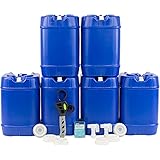Table of Contents
- The Importance of Water in Emergency Situations
- Methods to Store Water Safely
- How Much Water Should You Store?
- Maintaining Your Water Storage
The Importance of Water in Emergency Situations
They say you can last weeks without food, but only a few days without water. Water is, quite literally, life. When looking at emergency preparedness, it’s critical to focus on water storage because it lays the foundation for survival.
Picture this: a disaster strikes, the electricity is out, and your city’s water supply is either compromised or entirely unavailable. In such scenarios, having a stored supply of water isn’t just a nice-to-have; it’s a must-have. Ensuring your family doesn’t suffer from dehydration is non-negotiable.
Honestly, there’s a comfort in knowing you’ve prepped well. You’d be surprised how reassuring an ample supply of water can be. It’s like having an insurance policy that you’re almost certain to use.
Methods to Store Water Safely
So, you’re convinced: water storage is essential. But how do you store it safely? Believe me, it’s not just as simple as filling a bunch of old milk jugs with tap water. The way you store water can affect its quality and your health.
Plastic containers are a popular choice, but you need to ensure they’re food-grade quality and free from harmful chemicals. My go-to is often those large, blue, BPA-free containers. They’re sturdy, durable, and specifically designed for water storage.
Another method, especially if you have limited space, is using collapsible water containers. These are great because they’re lightweight and can be easily stored when not in use. It’s also worth considering water storage bags if you’re looking for something lightweight and portable.
How Much Water Should You Store?
Alright, let’s talk quantity. How much water is enough? Well, the general rule of thumb is one gallon of water per person per day. Now, that might sound like a lot, but that covers both drinking and hygiene needs.
Let’s break it down. If you’re prepping for a family of four for a week, you’re looking at 28 gallons. It’s a hefty amount, but it’s entirely manageable if you plan and prioritize correctly. Trust me, it’s better to be over-prepared than under-prepared.
== > What if ... Get a FREE Subscription to PREPARE
I find it helpful to keep a checklist or a log of water usage. This way, you get a better understanding of your actual needs and can adjust your storage plans accordingly.
Maintaining Your Water Storage
So you’ve got your water stored. Now what? Maintenance is key to ensuring your water remains safe to use. Stagnant water, even if properly stored, can develop bacteria over time.
I recommend rotating your water storage every six months. Use the old water for gardening or other non-drinking purposes, and replace it with fresh water. This practice ensures a constant fresh supply.
Another tip: label your containers with the date of storage. It might seem trivial, but it will make rotating your stock much simpler. Also, regular checks for leaks or contaminations can save a lot of hassle down the line.
FAQs
-
1. How can I purify stored water?
You can use water purification tablets, household bleach (unscented and free of additives), or a water filter designed to remove bacteria and viruses. Always follow the manufacturer’s instructions for safe usage.
-
2. Can I store water in any container?
It’s best to avoid containers that have previously held non-food items or are not food-grade. Always opt for BPA-free, food-grade plastic or glass containers designed for long-term water storage.
-
3. What if I don’t have space for large water containers?
If space is an issue, opt for collapsible water containers or store bottled water, which can be easily tucked into smaller spaces. Another option is to store water in multiple smaller containers scattered across your home.
-
4. How long can water be stored safely?
Properly stored water can typically last up to six months. It’s crucial to rotate and refresh your water supply regularly and perform regular checks to ensure there are no leaks or contamination.
Related Content
S.O.S. Rations Emergency 3600 Calorie Food Bar (Cinnamon + Coconut, 2 Pack)
$17.00 (as of March 3, 2026 12:14 GMT -05:00 - More infoProduct prices and availability are accurate as of the date/time indicated and are subject to change. Any price and availability information displayed on [relevant Amazon Site(s), as applicable] at the time of purchase will apply to the purchase of this product.)Sterno 100-Hour Emergency Candles - Long Burning Unscented Candles for Emergencies and Power Outages - Burns Up to 100 Hours - Set of 6 - Clean Burning Liquid Paraffin
$36.99 (as of March 3, 2026 12:14 GMT -05:00 - More infoProduct prices and availability are accurate as of the date/time indicated and are subject to change. Any price and availability information displayed on [relevant Amazon Site(s), as applicable] at the time of purchase will apply to the purchase of this product.)AquaPodKit Made in USA - Emergency Bathtub Water Storage Bladder 65-100 Gallon Capacity - BPA Free- Food Grade Materials - Hurricane Disaster Preparedness Supply - Family Survival Supply (Bag)
$32.95 (as of March 3, 2026 12:14 GMT -05:00 - More infoProduct prices and availability are accurate as of the date/time indicated and are subject to change. Any price and availability information displayed on [relevant Amazon Site(s), as applicable] at the time of purchase will apply to the purchase of this product.)Grizzly Gear Emergency Food Rations- 3600 Calorie Blueberry Bar - 3 Day, 72 Hour Supply For Disaster, Hurricane, Flood Preparedness - Less Sugar, More Nutrients Than Leading Brands - 5 Year Shelf Life
Now retrieving the price.
(as of March 3, 2026 12:14 GMT -05:00 - More infoProduct prices and availability are accurate as of the date/time indicated and are subject to change. Any price and availability information displayed on [relevant Amazon Site(s), as applicable] at the time of purchase will apply to the purchase of this product.)





